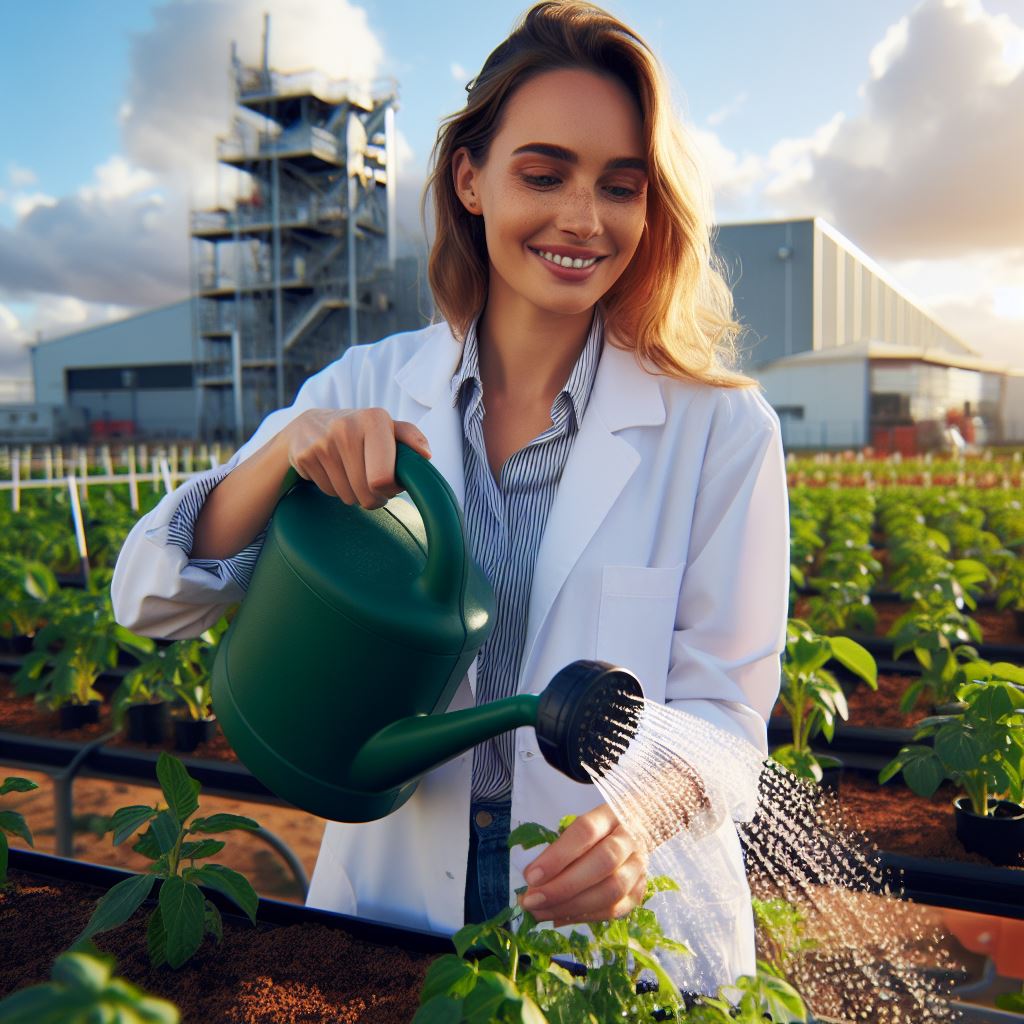Introduction
In Australia, sustainable farming stands as a cornerstone of both environmental stewardship and economic vitality.
The importance of sustainable farming practices transcends mere agricultural output; it embodies a commitment to preserving the land for future generations while bolstering the nation’s economic prosperity.
Sustainable farming is indispensable for ensuring the long-term viability of Australia’s agricultural sector.
By employing methods that prioritize soil health, water conservation, and biodiversity preservation, farmers not only safeguard the natural resources upon which their livelihoods depend but also mitigate the adverse impacts of climate change.
Moreover, agriculture holds a central position in Australia’s economy, serving as a significant contributor to its GDP and employment landscape.
The sector not only sustains rural communities but also plays a pivotal role in global food security and trade.
As such, the adoption of sustainable farming practices is not just an environmental imperative but an economic necessity.
Recognizing the interconnectedness of sustainable farming with environmental resilience and economic prosperity, this blog post seeks to delve into the intricacies of sustainable agriculture in Australia.
Through a comprehensive examination of sustainable farming practices and their impact on both the environment and the economy, we aim to underscore the critical role that sustainable agriculture plays in shaping the nation’s future.
Join us as we navigate the pathways toward a more sustainable and prosperous agricultural sector in Australia, where the principles of environmental stewardship and economic viability converge to create a brighter tomorrow.
Overview of Sustainable Farming
Definition and Explanation of Sustainable Farming Practices:
- Sustainable farming refers to the method of cultivating crops and raising livestock in a way that preserves the environment and addresses future needs.
- It involves utilizing techniques that minimize soil degradation, reduce water pollution, and promote biodiversity.
- Rotating crops, using organic fertilizers, and practicing integrated pest management are essential practices in sustainable farming.
- Conservation tillage, which reduces soil erosion, along with precision agriculture, helps maximize resource use efficiency.
- Sustainable farmers prioritize the well-being of livestock, ensuring they have access to proper nutrition, living conditions, and healthcare.
Importance of Sustainable Farming for the Environment and Future Generations
- Sustainable farming plays a vital role in safeguarding the environment by reducing the use of chemicals and preserving natural resources.
- By minimizing soil erosion and enhancing soil health, sustainable farming helps maintain the fertility of agricultural land for future generations.
- Efficient water management, such as using drip irrigation, helps conserve this valuable resource and protects water bodies from contamination.
- Sustainable farming practices promote biodiversity by creating suitable habitats for beneficial insects, birds, and other wildlife.
- By avoiding excessive use of pesticides and fertilizers, sustainable farming reduces air and water pollution, benefiting both human health and the environment.
- Adopting sustainable farming practices can lead to increased carbon sequestration, mitigating the impacts of climate change.
- Sustainable farming contributes to the creation of resilient and sustainable food systems, ensuring food security for future generations.
- By supporting local and organic agriculture, consumers can actively participate in sustainable food production and reduce their carbon footprint.
- Sustainable farming reduces dependence on non-renewable resources like fossil fuels, leading to a more sustainable energy future.
- The adoption of sustainable farming practices helps farmers diversify their income streams and improves their long-term economic viability.
- Preservation of traditional farming knowledge and the promotion of agroecology are crucial aspects of sustainable farming.
- Sustainable farming fosters community engagement, as farmers collaborate and share knowledge, ensuring the dissemination of best practices.
In short, sustainable farming practices are essential for preserving the environment, ensuring future food security, and creating resilient agricultural systems.
By prioritizing the health of ecosystems, conserving resources, and minimizing pollution, sustainable farmers protect natural resources and promote biodiversity.
Consumers also play a crucial role by supporting sustainable agriculture and making conscious choices. Together, we can build a more sustainable future for agriculture and future generations.
Read: Future of Agri-Environmental Management in AU
Current state of farming in Australia
Prevalent farming practices
- Monoculture: Many farmers in Australia practice monoculture, focusing on a single crop or livestock species.
- Excessive use of pesticides: To protect crops from pests, farmers often rely heavily on pesticides.
- Intensive farming: The use of high input systems, such as irrigation, fertilizers, and machinery, is common.
Negative impacts on the environment and ecosystem
- Loss of biodiversity: Monoculture reduces habitat diversity, threatening native wildlife populations.
- Soil degradation: Continuous cultivation and excessive use of chemical inputs decrease soil fertility.
- Water pollution: The runoff of pesticides and fertilizers contaminates water bodies, harming aquatic ecosystems.
- Soil erosion: Intensive farming practices leave soil exposed, leading to erosion and loss of topsoil.
- Decline in pollinators: Pesticides harm bees and other pollinators crucial for crop production.
- Greenhouse gas emissions: The energy-intensive practices of farming contribute to climate change.
Path towards sustainable farming
- Diversification: Encouraging farmers to adopt diverse cropping systems and integrate livestock.
- Organic farming: Reducing pesticide use and promoting natural soil fertility through organic practices.
- Conservation agriculture: Implementing practices like minimum tillage to prevent soil erosion.
- Water management: Promoting efficient irrigation techniques and reducing water wastage.
- Integrated pest management: Encouraging the use of biological controls and crop rotation to reduce pesticide use.
- Agroforestry: Planting trees alongside crops to promote biodiversity and provide ecosystem services.
The benefits of sustainable farming
- Preservation of biodiversity: Diverse cropping systems support native flora and fauna.
- Soil health improvement: Sustainable practices enhance soil fertility and reduce erosion.
- Water conservation: Efficient irrigation reduces water usage and minimizes pollution.
- Resilient farms: Sustainable practices build resilience to climate change and market fluctuations.
- Enhanced food quality: Organic and sustainable farming methods produce healthier and tastier food.
- Economic benefits: Sustainable farming can lead to cost savings and increased market demand for sustainably produced products.
Challenges and future prospects
- Knowledge and education: Educating farmers about sustainable practices and their benefits is crucial.
- Policy support: Governments need to provide incentives and regulations to promote sustainable farming.
- Consumer awareness: Creating awareness and demand for sustainably produced food among consumers.
- Technological advancements: Investing in research and technology to improve sustainable farming practices.
- Collaboration: Encouraging partnerships between farmers, scientists, and policymakers for knowledge sharing.
- Addressing market barriers: Ensuring that sustainable farming practices are economically viable for farmers.
In fact, the current state of farming in Australia is dominated by monoculture and excessive pesticide use, causing negative impacts on the environment and ecosystems.
However, there is a path towards sustainable farming through diversification, organic practices, and improved water and pest management.
Sustainable farming offers multiple benefits, but challenges like knowledge gaps and policy support need to be addressed for a sustainable agriculture future in Australia.
Read: Biodiversity: Enviro Manager’s Role in AU
Benefits of Sustainable Farming
Sustainable farming offers numerous advantages that contribute to a healthier environment, improved soil health, biodiversity, and water conservation.
Additionally, it plays a crucial role in mitigating and adapting to climate change. Let’s explore these benefits further:
Improved Soil Health
Sustainable farming practices, such as crop rotation, cover cropping, and organic fertilizers, enhance soil fertility, structure, and nutrient content.
Biodiversity Conservation
Sustainable farming encourages the preservation of biodiversity by providing diverse habitats, avoiding chemical inputs, and promoting natural pest control.
Water Conservation
Sustainable farming techniques like drip irrigation, rainwater harvesting, and precision agriculture reduce water usage and minimize the impact on local water resources.
Climate Change Mitigation
Sustainable farming practices can significantly reduce greenhouse gas emissions, which contribute to climate change. For example, organic farming eliminates synthetic fertilizers that produce nitrous oxide, a potent greenhouse gas.
Climate Change Adaptation
Sustainable farming methods help farmers adapt to the changing climate by improving soil moisture retention, minimizing erosion, and diversifying crops to withstand weather fluctuations.
Preservation of Natural Resources
Sustainable farming protects natural resources, such as arable land, by implementing techniques that reduce soil degradation and erosion.
Enhanced Food Security
Sustainable farming promotes food security by ensuring the long-term availability of nutritious crops while minimizing the reliance on synthetic inputs and minimizing the risk of crop failures.
Economic Benefits
While transitioning to sustainable practices may require initial investments, farmers can benefit from reduced input costs, improved soil quality, and access to premium markets seeking sustainable products.
Your Personalized Career Strategy
Unlock your potential with tailored career consulting. Get clear, actionable steps designed for your success. Start now!
Get StartedReduced Chemical Exposure
Sustainable farming reduces the exposure of farmers, farmworkers, and consumers to harmful pesticides, herbicides, and synthetic fertilizers, promoting a safer and healthier environment.
Improved Rural Communities
Sustainable farming practices contribute to vibrant rural communities by preserving local ecosystems, providing employment opportunities, and strengthening the local economy.
Long-Term Viability
By maintaining the health of the land and minimizing environmental impacts, sustainable farming ensures the long-term viability and productivity of agricultural systems.
Sustaining Ecosystem Services
Sustainable farming preserves essential ecosystem services like pollination, water filtration, and carbon sequestration, which are crucial for maintaining a balanced and healthy environment.
In summary, sustainable farming offers a multitude of benefits for both the environment and society.
From improved soil health and biodiversity conservation to climate change mitigation and economic viability, adopting sustainable practices is crucial for a more sustainable future.
By prioritizing sustainability in agriculture, we can ensure a better quality of life for present and future generations.
Read: Soil Health: Top Priority for AU Enviro Experts

Case Studies of Sustainable Farming in Australia
Successful Sustainable Farming Projects
- The Murray Darling Basin: Implementing water-efficient irrigation systems and promoting crop rotation strategies.
- Tassie Salmon Farms: Utilizing ocean-based pens that maintain water quality and minimize waste.
- Victoria’s Goulburn Valley: Practicing regenerative agriculture techniques, such as cover cropping and rotational grazing.
Australia showcases several successful sustainable farming projects across different regions, demonstrating the country’s commitment to environmentally responsible agricultural practices.
These projects serve as inspiring examples and pave the way for a more sustainable future in farming.
One such project can be seen in the Murray Darling Basin, where farmers have implemented water-efficient irrigation systems and adopted crop rotation strategies.
By utilizing modern irrigation technologies, they reduce water consumption and ensure that water resources are utilized effectively.
Additionally, the adoption of crop rotation helps to enhance soil fertility and reduce dependence on synthetic fertilizers.
Tassie Salmon Farms, located in Tasmania, are exemplary in their sustainable farming practices.
By using ocean-based pens, they maintain water quality and prevent the spread of diseases to wild fish populations.
These pens also eliminate the risk of environmental damage caused by fish waste accumulation.
The Tassie Salmon Farms serve as a model for sustainable aquaculture practices that prioritize ecosystem health.
Furthermore, Victoria’s Goulburn Valley showcases sustainable farming through regenerative agriculture techniques.
Farmers in this region practice cover cropping, a method that involves planting crops to protect and enrich the soil during fallow periods.
Rotational grazing is also implemented, allowing pastures to recover naturally and maintaining soil health.
These practices promote biodiversity, reduce erosion, and enhance the overall resilience of the farming systems.
Methods and Techniques Utilized
- Organic Farming: Avoiding synthetic pesticides, antibiotics, and genetically modified organisms to maintain soil health.
- Agroforestry: Integrating trees into farming systems for enhanced biodiversity, shade, and carbon sequestration.
- Integrated Pest Management: Employing a combination of biological controls, crop rotation, and monitoring to reduce pesticide use.
To achieve sustainable farming, various methods and techniques are employed by these successful projects.
Organic farming, for instance, is a prevalent approach that avoids synthetic pesticides, antibiotics, and genetically modified organisms.
By prioritizing soil health and fertility, organic farms contribute to long-term sustainability and produce nutritious, chemical-free food.
Agroforestry, the integration of trees into farming systems, is another effective technique used.
These trees provide shade for livestock, attract beneficial insects, and help mitigate climate change by sequestering carbon dioxide.
The presence of trees also enhances biodiversity, creating a balanced ecosystem within the farm.
Integrated Pest Management (IPM) techniques are crucial in reducing the reliance on chemical pesticides.
IPM relies on biological controls, such as predatory insects, to manage pests naturally.
Crop rotation is also an essential element of IPM, breaking pest life cycles and minimizing the buildup of pests.
By utilizing these methods, farmers can effectively control pests while minimizing the environmental impact associated with chemical treatments.
In general, sustainable farming in Australia encompasses numerous successful projects that span different regions and utilize various methods.
The Murray Darling Basin, Tassie Salmon Farms, and Victoria’s Goulburn Valley are just a few examples of farms implementing sustainable practices.
Through organic farming, agroforestry, and integrated pest management, these farms prioritize biodiversity, soil health, and water conservation.
Their success serves as inspiration for other farmers and contributes to a more sustainable and resilient agricultural sector in Australia.
Read: Tech Advances in Enviro Management: AU Focus
Challenges and barriers to sustainable farming
When it comes to adopting sustainable farming practices, farmers often face various obstacles. These challenges can hinder their efforts to transition towards a more sustainable approach. Some of the common barriers include:
Lack of knowledge and awareness
Many farmers lack the necessary knowledge and awareness about sustainable farming techniques. They may not be familiar with the best practices or the potential benefits it can bring to their farms.
Financial constraints
The implementation of sustainable farming methods often requires an initial investment. However, many farmers struggle with financial constraints that prevent them from adopting these practices.
The cost of equipment, technology, and infrastructure can be significant.
Market demands
Meeting market demands for sustainable products can be challenging. Some farmers may hesitate to transition to sustainable farming if they believe there is no market for their products or if they are uncertain about consumer preferences.
Limited access to resources
In some regions, farmers may face limited access to resources such as water, fertilizers, or land. These limitations can make it difficult for them to implement sustainable farming practices effectively.
Stand Out with a Resume That Gets Results
Your career is worth more than a generic template. Let us craft a resume and cover letter that showcase your unique strengths and help you secure that dream job.
Get HiredClimate and environmental factors
The unpredictable nature of climate and environmental factors can pose challenges to sustainable farming. Extreme weather events, changing rainfall patterns, or soil degradation can significantly impact farmers’ ability to adopt sustainable practices.
Recognizing the barriers faced by farmers, government support and incentives play a crucial role in facilitating the transition towards sustainable farming. Here’s why government involvement is essential:
Financial assistance
The government can provide financial support in the form of grants, subsidies, or low-interest loans to help farmers overcome the initial investment required for sustainable farming practices.
Education and training
Governments can organize workshops, training programs, and educational campaigns to increase farmers’ awareness and knowledge of sustainable farming techniques. This can empower them to adopt more environmentally friendly practices.
Policy formulation
The government can develop and implement policies that promote sustainable farming. This includes regulations on the use of chemicals, incentives for conservation practices, and penalties for unsustainable practices.
Market support
Government intervention can help create a favorable market environment for sustainable products. By collaborating with retailers and consumers, governments can stimulate demand for sustainable farming products and ensure fair prices for farmers.
Research and development
The government can allocate funds for research and development in sustainable farming practices. This can lead to innovative solutions, technologies, and techniques that make sustainable farming more accessible and efficient.
In a nutshell, the obstacles farmers face in adopting sustainable farming practices, such as lack of knowledge, financial constraints, and market demands, can be daunting.
However, with the necessary government support and incentives, these barriers can be overcome.
By providing financial assistance, education, and policy formulation, governments can play a crucial role in facilitating the transition towards sustainable farming in Australia.
Learn More: Foresters’ Tools: A Guide for Beginners
Delve into the Subject: Australian Farm Policy: Current Issues Explained
Government initiatives and policies
Government initiatives and policies play a crucial role in promoting sustainable farming practices in Australia.
The Australian government has implemented various initiatives to support farmers and encourage sustainable agricultural practices.
Additionally, it has introduced several policies, grants, and programs to assist farmers in adopting sustainable methods and ensure the long-term viability of the agricultural sector.
One of the key initiatives undertaken by the Australian government is the National Landcare Program.
This program aims to improve soil health, water quality, and biodiversity by supporting farmers in implementing sustainable land management practices.
It provides funding for projects that promote sustainable agriculture, such as soil conservation, water efficiency, and pest management.
In addition to the National Landcare Program, the government has also introduced the Emissions Reduction Fund.
This fund provides financial incentives to farmers who undertake projects to reduce greenhouse gas emissions.
By rewarding farmers for adopting sustainable land management practices, this program encourages the use of sustainable farming techniques, such as carbon sequestration and methane capture.
Another important government initiative is the Farm Household Allowance (FHA).
The FHA provides financial assistance to farmers who are experiencing financial hardship.
By helping farmers during challenging times, this initiative ensures the continuity of sustainable farming practices and prevents land degradation that can occur due to financial constraints.
Relevant policies, grants, and programs available to farmers
Moreover, the Australian government has implemented various policies to support sustainable farming.
One such policy is the Sustainable Agriculture Research and Development Program.
This program funds research projects that focus on developing sustainable farming practices, crop improvement, and natural resource management.
By investing in research and innovation, the government aims to equip farmers with the knowledge and tools to adopt sustainable methods.
The government also offers grants and programs to farmers to facilitate the transition towards sustainable farming.
The Farming Together Program provides funding and support for farmer-initiated projects that aim to improve farm productivity and sustainability.
This program encourages collaboration among farmers and the adoption of innovative and sustainable practices.
Furthermore, the Australian government has established the National Environmental Science Program (NESP).
This program focuses on conducting research and developing scientific knowledge to address environmental challenges, including those related to agriculture.
The findings of this research are used to inform policies and practices that promote sustainable farming.
Through these initiatives, policies, grants, and programs, the Australian government is actively supporting farmers in their efforts towards sustainable agriculture.
By providing financial assistance, research support, and incentives, the government aims to ensure the long-term viability of the agricultural sector while minimizing its environmental impact.
In review, the Australian government is taking significant steps to promote sustainable farming practices.
Through initiatives such as the National Landcare Program, the Emissions Reduction Fund, and the Farm Household Allowance, it provides financial support and incentives for farmers to adopt sustainable methods.
Additionally, policies like the Sustainable Agriculture Research and Development Program and grants like the Farming Together Program facilitate the adoption of innovative and sustainable farming practices.
By investing in research, providing financial assistance, and implementing supportive policies, the government strives to ensure the sustainability of the agricultural sector for future generations.
See Related Content: Agri Scientist Salaries in Australia
Discover More: Australian Women in Farming: Breaking Barriers
Transform Your LinkedIn for Maximum Impact
Elevate your professional brand with a LinkedIn profile that attracts recruiters, showcases your expertise, and maximizes opportunities. Stand out in your industry with a profile built for success.
Boost ProfileThe role of consumers
The role of consumers in sustainable farming is crucial for promoting sustainable farming practices.
Consumer support is vital in maintaining sustainable farming methods and ensuring their continued success.
When consumers choose to buy locally produced and sustainably farmed products, they contribute to several significant benefits.
Environmental Benefits
Locally produced and sustainably farmed products reduce the carbon footprint associated with transportation and distribution.
Buying locally reduces the need for long-distance shipping, thus minimizing greenhouse gas emissions.
Preservation of Biodiversity
Supporting sustainable farming practices helps protect biodiversity by preserving natural habitats.
Sustainable farmers often employ methods that are less harmful to local ecosystems and wildlife.
Water Conservation
Buying sustainably farmed products promotes water conservation as sustainable farmers strive to minimize water usage.
They implement irrigation techniques that optimize water efficiency and reduce wastage.
Chemical-free Farming
Sustainable farming practices prioritize the use of organic and natural methods over chemical pesticides and fertilizers.
By purchasing sustainably farmed products, consumers encourage the reduction of harmful chemicals in the environment.
Support for Local Economy
Choosing to buy locally produced products ensures that money stays within the local community.
This supports local farmers and businesses, contributing to the overall economic growth and stability of the region.
Quality and Freshness
Locally produced products often offer superior taste and freshness compared to those from distant sources.
By buying locally, consumers can enjoy high-quality and nutritious food.
Connection to the Source
Buying sustainably farmed products creates a connection between consumers and the food they consume.
Consumers can learn about the farming practices and the farmers behind their food, fostering a sense of community.
Encouraging Innovation
Consumer demand for sustainably farmed products encourages innovation in farming techniques.
Farmers are motivated to find new ways to improve sustainability, leading to more efficient and eco-friendly practices.
Food Security
Supporting sustainable farming helps strengthen food security by promoting diverse, localized food production.
By reducing dependence on large-scale monoculture, sustainable farming ensures a more resilient food system.
Health Benefits
Sustainably farmed products are often healthier as they are less likely to contain harmful chemicals.
Choosing sustainably farmed products supports a healthier lifestyle and overall well-being.
Basically, consumers play a vital role in promoting sustainable farming practices in Australia.
By emphasizing the importance of consumer support and choosing locally produced and sustainably farmed products, individuals can contribute to a healthier environment, support local communities, and improve their own well-being.
Conclusion
Concluding this discourse, we’ve traversed the terrain of sustainable farming in Australia, unearthing key insights vital for the future of agriculture.
Throughout, we’ve underscored the imperative of adopting sustainable practices, emphasizing their pivotal role in ensuring agricultural resilience and viability.
Recapping our journey, we’ve delved into various facets of sustainable farming, from soil health management to water conservation and biodiversity preservation.
These practices not only optimize resource utilization but also mitigate environmental degradation, fostering a harmonious coexistence between agriculture and nature.
As we look ahead, it becomes increasingly clear that sustainable farming isn’t just a choice; it’s a necessity for the future of agriculture in Australia.
The challenges posed by climate change and dwindling natural resources demand proactive measures, and sustainable farming provides a tangible solution.
By prioritizing practices that promote long-term ecological balance and economic viability, we pave the way for a resilient agricultural sector capable of weathering the storms of tomorrow.
In essence, sustainable farming isn’t merely a trend; it’s a fundamental shift in agricultural paradigms.
It’s about nurturing the land that sustains us, preserving biodiversity, and ensuring food security for generations to come.
By embracing sustainable practices today, we sow the seeds for a brighter, more sustainable future for Australian agriculture.




